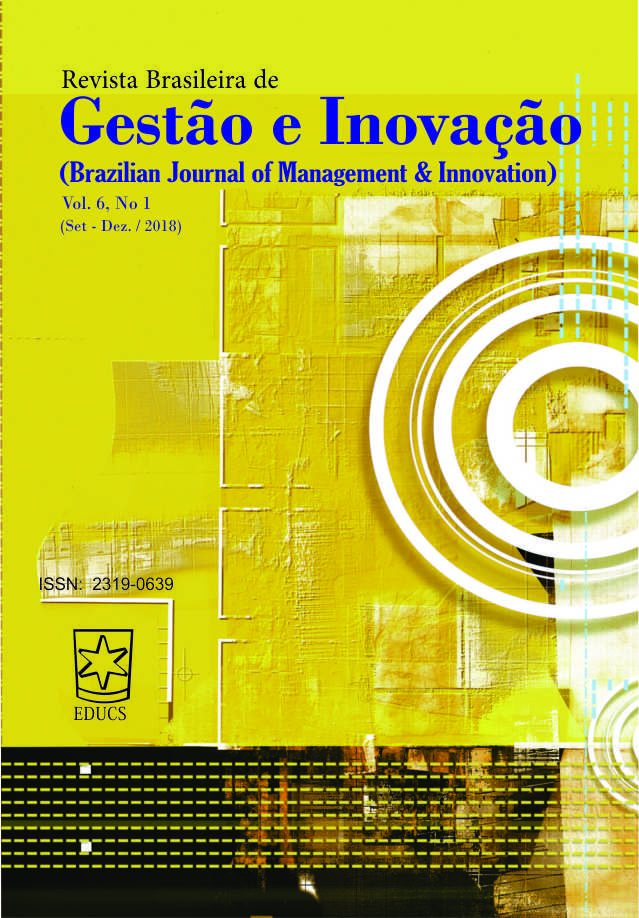A RELAÇÃO DOS DISPÊNDIOS EM P&D E O CRESCIMENTO ECONÔMICO DO BRASIL: UMA ANÁLISE POR VETORES AUTO REGRESSIVOS | THE RELATIONSHIP OF EXPENDITURE IN R&D AND THE ECONOMIC GROWTH OF BRAZIL: AN ANALYSIS BY VECTOR AUTO REGRESSIVE MODEL
Keywords:
P&D. Inovação. Vetores Auto Regressivos.Abstract
Este trabalho tem como objetivo analisar se há impacto entre os dispêndios gastos em Pesquisa e Desenvolvimento com o crescimento econômico no Brasil no período de 2000 a 2015, especificamente, avaliar a influência desses gastos no Produto Interno Bruto (PIB) e nos pedidos de patentes nacionais, utilizando o modelo de Vetores Auto Regressivos – VAR para analisar os resultados. O VAR foi desenvolvido por Christopher Sims na década de 80 como resposta às críticas ao grande número de advertências impostas pelos valores dos modelos estruturais. No modelo, cada variável endógena é explicada por seus valores defasados e pelos valores defasados de todas as outras variáveis endógenas incluídas no modelo. Os resultados apresentaram efeito positivo dos dispêndios públicos e privados no crescimento do PIB e no aumento da quantidade de patentes depositadas. Pode-se concluir que a inserção do Brasil no cenário mundial ainda é pequena em vista a outros países desenvolvidos tecnologicamente. Isto implica a dependência da capacidade de inovação das empresas, estreita relação com os incentivos à inovação no setor privado e a contratação da mão-de-obra qualificada disponível no mercado internacional. Por isso, exige-se ações governamentais de apoio à pesquisa e desenvolvimento do setor privado e melhoras nos investimentos em universidades públicas e privadas existentes no país.
Downloads
Published
How to Cite
Issue
Section
License
The author must guarantee that:
- there is full consensus among all the coauthors in approving the final version of the document and its submission for publication.
- the work is original, and when the work and/or words from other people were used, they were properly acknowledged.
Plagiarism in all of its forms constitutes an unethical publication behavior and is unacceptable. Revista Brasileira de Gestão e Inovação has the right to use software or any other method of plagiarism detection.
All manuscripts submitted to RBGI - Revista Brasileira de Gestão e Inovação go through plagiarism and self-plagiarism identification. Plagiarism identified during the evaluation process will result in the filing of the submission. In case plagiarism is identified in a manuscript published in the journal, the Editor-in-Chief will conduct a preliminary investigation and, if necessary, will make a retraction.
This journal, following the recommendations of the Open Source movement, provides full open access to its content. By doing this, the authors keep all of their rights allowing Revista Brasileira de Gestão e Inovação to publish and make its articles available to the whole community.
RBGI - Revista Brasileira de Gestão e Inovação content is licensed under a Creative Commons Attribution 4.0 International License.
Any user has the right to:
- Share - copy, download, print or redistribute the material in any medium or format, linking to RBGI site.
- Adapt - remix, transform and build upon the material for any purpose, even commercially.
According to the following terms:
- Attribution - You must give appropriate credit, provide a link to the license, and indicate if changes were made. You may do so in any reasonable manner, but not in any way that suggests the licensor endorses you or your use.
- No additional restrictions - You may not apply legal terms or technological measures that legally restrict others from doing anything that the license permits.
#RBGI







